‘The best reality TV’: how a falcon couple’s saga mesmerized a human audience
Territorial challenges, a disappearance, death and renewal: the livestreamed saga of Grinnell and Annie offered drama aplenty
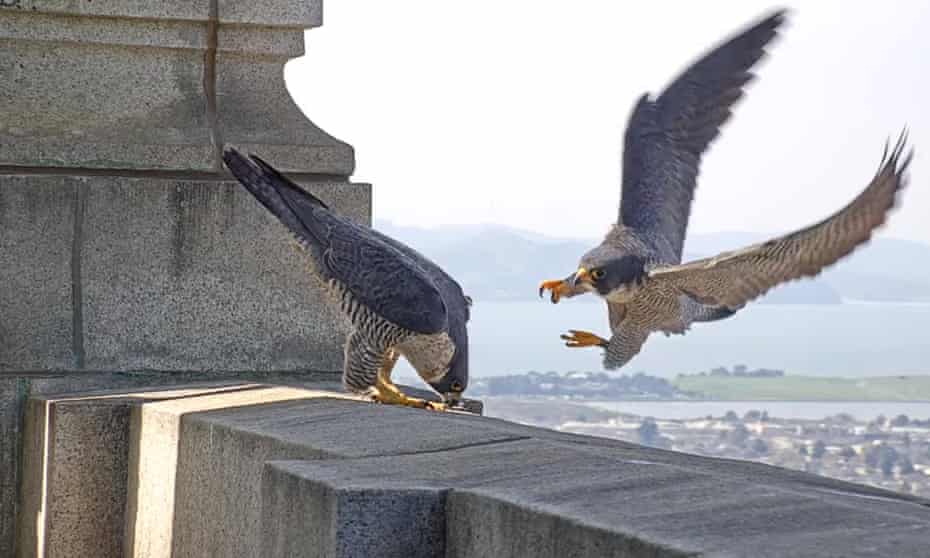
At the foot of a bell tower on the campus of UC Berkeley, bouquets of flowers, written eulogies and framed photos have piled up as residents mourn the death of a beloved celebrity.
But not just any celebrity – a peregrine falcon named Grinnell, whose live-streamed exploits with his partner Annie captured the hearts of thousands of viewers.
Scientists at the volunteer organization Cal Falcons have been monitoring the pair for years, broadcasting their daily routines via three cameras situated at the top of the campanile where they nested. Grinnell’s death on 31 March, after apparently being hit by a car, capped a dramatic year for the falcons that included a near fatal attack, a love triangle, a mysterious disappearance, and an unexpected new beginning.
And viewers were hooked. The number of people following the couple online rose to more than 20,000, bringing comfort and entertainment in a volatile era.
“They became a symbol of hope,” said Lynn Schofield, a biologist with the research nonprofit Institute for Bird Populations, who helps coordinate and monitor the streams. “It was the idea that amid all our messy human affairs, in this time of being so divided, there is something genuinely good that brings everyone together.”
The news of Grinnell’s death prompted an outpouring of grief and tributes from dedicated fans as far away as London and Australia, many of whom have watched as the pair – which typically mate for life – raised and fledged five broods of chicks.
“I can hardly digest this news,” one user wrote on social media. “There are no words to describe my grief,” another said. Sharon Pollack, a Bay Area viewer who has been following the falcons since 2019, said Grinnell’s death felt like “losing a family member”.
For those who count themselves as followers of the falcon cam, the outpouring came as no surprise. The story of Grinnell and Annie began when the pair made their first nest right after the 2016 election. As the pandemic hit and life grew more chaotic, many yearned to get closer to nature, to observe as the pair simply provided for their young and cared for one another, unaware of the global crises unfolding around them.
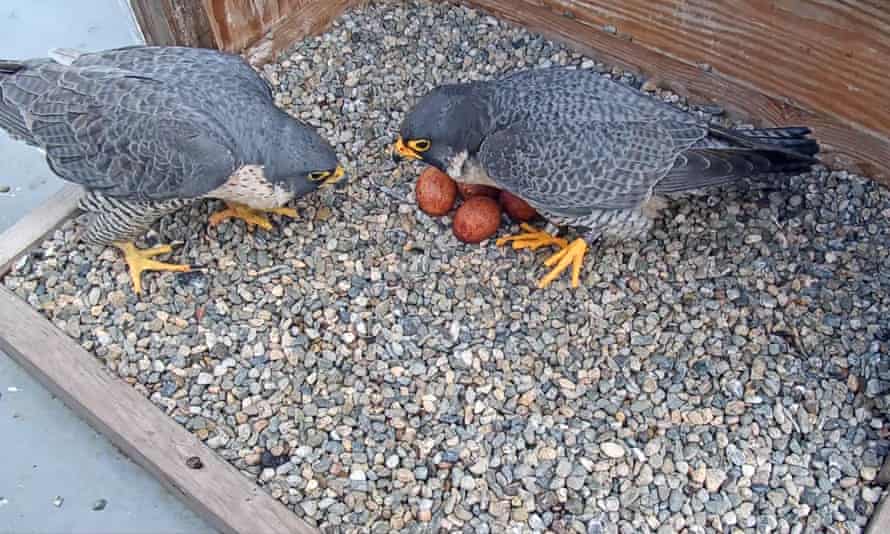
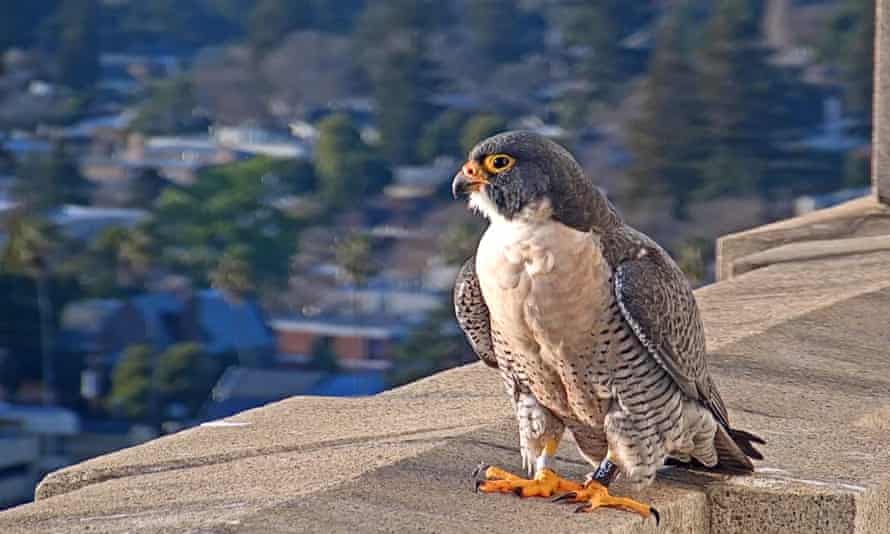
Many viewers say they keep the falcon feed on all day – in the background at work or playing at home for their children – and some even say they wake up in the middle of the night to check on the falcons. The cameras became a constant background stream for Kim Rankin, another Bay Area viewer, after her husband was diagnosed with brain cancer in March 2019.
“That spring, as we were absorbing the magnitude of what we were facing, the Cal Falcons were nothing short of a spiritual lifeline for us,” she said. “At this time of year, we have the laptop open on the kitchen counter all day, just so we can watch Annie breathe as she broods. She is my meditation teacher.”
Molly, an intensive care unit nurse in Berkeley who declined to share her last name, said she and her family began to watch the live streams in early 2020. As she cared for Covid patients in overwhelmed hospitals, her husband would send her updates.
“I was sure I’d bring Covid home to the family, so it was an extremely frightening time for us, as for many,” she said. “It got us through in a lot of ways to watch the relationship of Annie and Grinnell. To watch the eggs hatch and to watch the chicks develop and fledge.”
Territorial battles
But the exploits of Annie and Grinnell weren’t always a peaceful solace. In late 2021, the falcon footage took an alarming turn, coming to more closely resemble a telenovela than the gentle, meditative streams of years past.
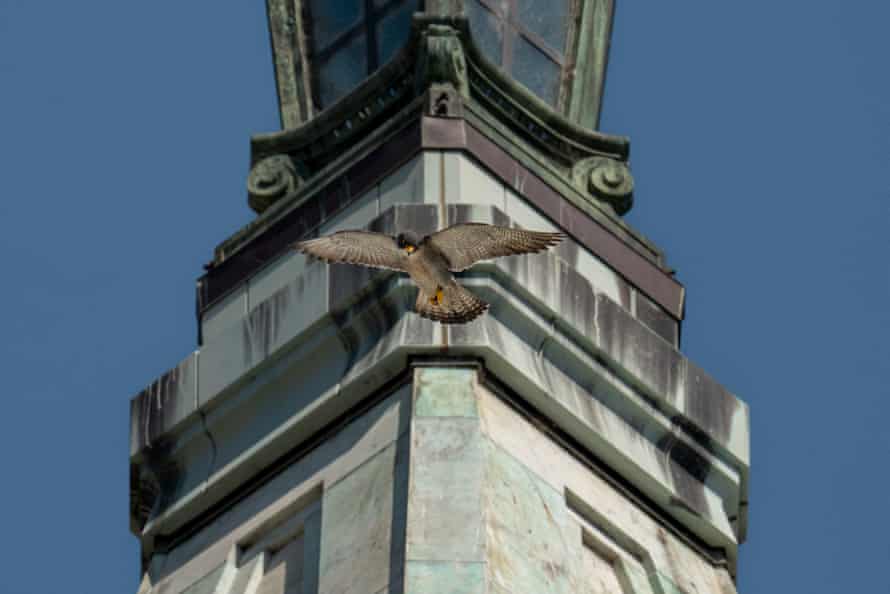
New falcons in the area increasingly fought the resident birds for their territory, culminating in stunning mid-air battles. As a result of one such attack, Grinnell was found injured on campus in November 2021, unable to fly, and was taken to a local animal hospital to recover.
During his absence, Annie shocked viewers by shacking up with one of his attackers. “Grinnell, hurry up and get your girl back!” one commenter wrote. “Annie, don’t fall for this scheming Lothario! He’s up to no good!” said another.
Grinnell returned to the nest to reclaim his mate, and the competitor flew off. All was briefly well in the world – until Annie disappeared. Missing for more than a week, she was declared dead before defying all expectations and returning. “This is something that is totally unexpected and goes against pretty much everything we’ve seen,” the scientists wrote. “Queen Annie appears to be back.”
While the volatility has been difficult to stomach, scientists say it also represents a positive upturn for the peregrine falcon, which nearly went extinct in the 20th century due to the widespread use of the toxic insecticide DDT. By the time the chemical was banned in 1972, only a handful of falcon nests existed in the western United States.
“We don’t know if this level of competition for territory is typical because 50 years ago there were no falcons to compete with one another,” said Schofield. “In a sense, this major strife is a sign that the species has truly recovered.”
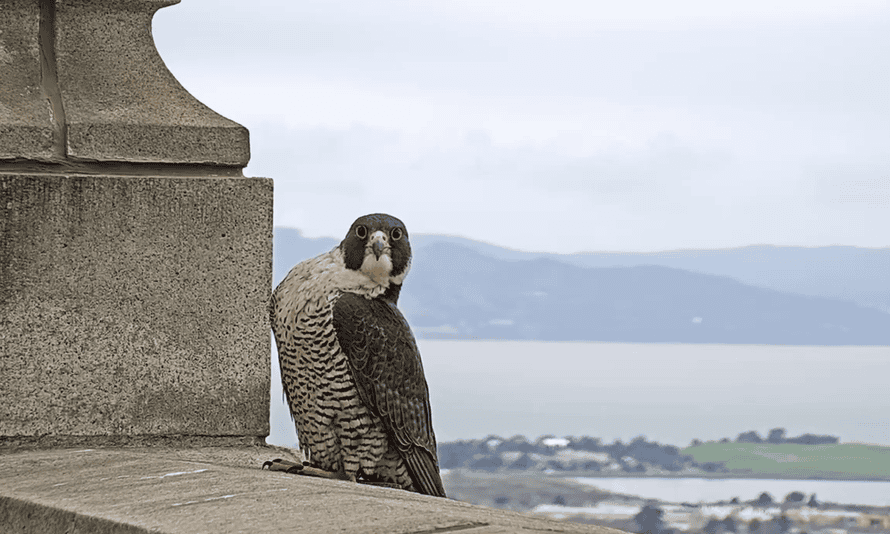
Compounding the grief surrounding Grinnell’s death, the pair had just produced a brood of eggs – one that could not be successfully reared with one parent. But when it seemed all was doomed, a new character entered the series in typically dramatic fashion. A new unknown male – with a distinctive injured left leg – was seen hanging around the nest. While falcons are typically territorial and quick to chase away interlopers, Annie seemed to be tolerating the visitor.
“When a mated peregrine dies during the breeding season, the most likely outcome is nest failure,” the scientists wrote in an Instagram post days after Grinnell’s death. “In rare cases, a new mate can come in, establish a bond with the remaining individual, and adopt the chicks. It is possible that we are witnessing this right now.”
A new partner, and a new chapter
Even as they grieve Grinnell’s loss, viewers are finding themselves endeared to the new falcon stepdad, despite themselves. In the past week he has defended the nest from other birds, sat on the eggs, and delivered a large mourning dove for breakfast. The new bird and Annie were seen copulating before she laid a third egg – meaning her offspring may now have two different biological fathers.
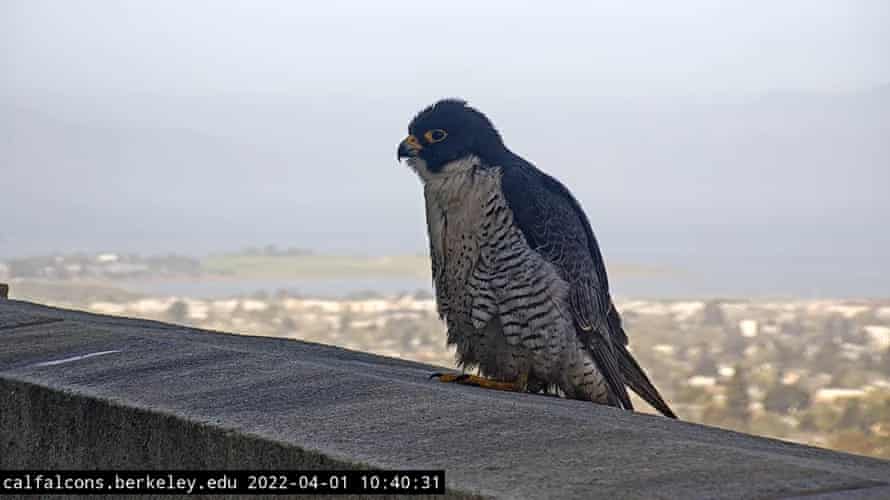
“A truly blended Berkeley family,” one user commented. “Life finds a way,” said another. Cal Falcons scientists are inviting viewers to name the new bird in an online competition. Among the top suggestions is Alden, a nod to museum director Alden Lewis, who succeeded Grinnell’s namesake Joseph Grinnell as head of the campus museum of vertebrate zoology in 1940.
Many say they are undeterred by the ups and downs of the past year, and will continue to see how “new guy” and Annie’s brood fare. Lizz Lagomarsino, a dedicated viewer for the past four years, found fresh hope after seeing a new family taking shape. After Grinnell’s death, she went into mourning, and found herself watching nonstop “until the social media feed confirmed this [new] guy was maybe going to work out”.
Lagomarsino and others hope their favorite story isn’t over yet. “Nature … falcons at the campanile … not for the faint of heart,” she said. “But you cannot find a better reality show right now.”